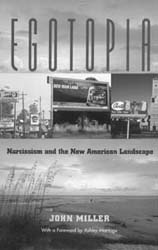Dark Satanic Malls
By Michael Learmonth
FOR MANY YEARS along Highway 9 in the Santa Cruz Mountains, the Christmas season brought out man's worst impulse. Christmas-tree farms proliferated, as did the number of signs along the median advertising this farm or that. Competition grew stiff. Sign begat sign. Soon, John Miller counted 65 littering a five-mile stretch of road.
"To me, it was an example of individual greed and ego invalidating the greater community," he says. Miller saw the Highway 9 signs as a microcosm of the commercial blight that afflicts much of the American landscape.
In his philosophical first book, Egotopia: Narcissism and the New American Landscape, Miller attempts to explain the increasing mallification, homogenization and commercialization of the United States. The idea that the American landscape is blighted by commercial excess is by no means new. But Miller takes the analysis a step further, arguing that the landscape that man creates directly mirrors his deepest-held values.
"The landscape reflects what is the dominant interest of most people in our society," Miller says. "What people have turned out to value more than anything is consumption and living out consumer fantasies."
Miller, a high-tech public-relations consultant and a founder of the Washington, DC-based group Scenic America, argues that America's roads, public spaces, park lands and even schools are molded primarily to facilitate the crass pursuit of wealth and materialism. What little scenic and historical America remains is not protected by the community's public concern, but by laws and tomes of local zoning ordinances.
"So little of our historic landscape remains that it is difficult to appreciate our present aesthetic deprivation," Miller writes in the cleverly titled chapter "Dark Satanic Malls."
By contrast, Miller recounts a trip to Bavaria where he saw villages in aesthetic harmony with the surrounding nature and history. In Bavaria, Miller writes, "apparently no laws are needed to protect the residents from themselves."
So who's responsible for the acres of cement, ubiquitous shopping malls, soulless tract neighborhoods and tacky illuminated signs all built for a purpose no deeper than to facilitate consumption? Miller places blame squarely on the shoulders of an archetype he calls the New Man.
The New Man has abandoned public concerns for private ones. He pursues his primary concern--consumption--without regard or respect for community, history or the American landscape. He creates his identity through the consumption of goods, services and psychotherapies. This is where Miller's analysis hits closest to home. Doubtless most of us can see a little of ourselves in Miller's New Man and the landscape he creates.
"The New American Landscape is not incidental, nor accidental, but intentional," Miller writes. "For the first time in history the landscape has been designed to stimulate and orchestrate the aggregate consumption of goods and services to facilitate the private pursuit of our individual desires."
MILLER DISTINGUISHES himself from other social critics in arguing not that machines of capitalism are inherently bad but that we are bad for not putting limits on them. By limits he doesn't mean laws, he means the common good sense not to put ads in schools or talk about money around the dinner table.
"Corporations are probably the most efficient mechanisms to facilitate consumption on the level that we demand it as a consumer society," Miller says. "Whenever we point a finger at corporations to some extent we are pointing a finger at ourselves."
The New Man invites the free market into every facet of life. The family, Miller argues, used to be exempt from the market. Now, the family is very much at the center of it. The free market has also been invited into the schools, putting advertisements on school buses, altering curriculums and changing the very purpose of education.
"Schools, at all levels, exist to help us get better jobs, to earn greater incomes, to consume more products and services," Miller says.
If Miller gave the hapless New Man a chance to respond, he might say, "Hey dude, lighten up. The McDonald's franchise is putting my kid in college and I like lawn ornaments. Besides, who are you to sit up there in the Santa Cruz Mountains and make judgments about me?"
Last Christmas, the gauntlet of gaudy signs along Highway 9 was replaced by a single county sign after some lobbying by the community. Miller was encouraged, but he says changing the New Man's mind-set may be the defining struggle of the next century: "I think we are going to see a lot more darkness aesthetically reflecting our inner selfishness before we see any light at the end of the tunnel."
[ San Jose | Metroactive Central | Archives ]
Copyright © Metro Publishing Inc. Maintained by Boulevards New Media.
![]()
 John Miller studies commercialization of the landscape in 'Egotopia'
John Miller studies commercialization of the landscape in 'Egotopia'
Egotopia: Narcissism and the New American Landscape by John Miller; University of Alabama Press; 168 pages; $29.95 cloth.
From the April 9-15, 1998 issue of Metro.
![[Metroactive Books]](/books/gifs/books468.gif)